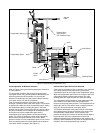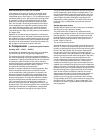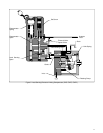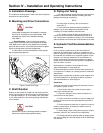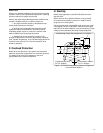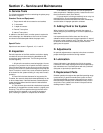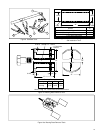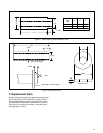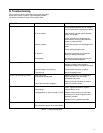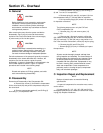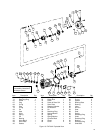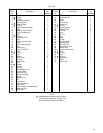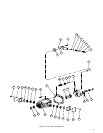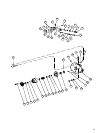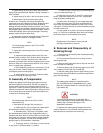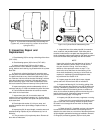
17
G. Troubleshooting
Table 3 lists the common difficulties experienced with piston
pumps and hydraulic systems. It also indicates probable
causes and remedies for each of the troubles listed.
TROUBLE PROBABLE CAUSE REMEDY
Excessive pump noise. Low oil level in the reservoir
Air in the system
Vacuum condition
Oil too thick
Cold weather
Fill reservoir to proper level with the
recommended transmission fluid. DO NOT
over fill transmission or damage may result.
Open reservoir cap and operate hydraulic
system until purged.
“Bleed” hydraulic lines at highest point
downstream of auxiliary pump and while
system is under pressure.
Check inlet (suction) lines and fittings for air
leaks.
Check auxiliary pump function.
Be certain correct type of oil is used for
refilling or adding to the system.
Run hydraulic system until unit is warm to
the touch and noise disappears.
Pump overheating Internal leakage
Heat exchanger not functioning
Fluid level low
If established that excessive internal
leakage is evident, return vehicle to
maintenance shop for evaluation and repair.
Locate trouble and repair or replace.
Add oil to operating level.
System not developing pressure Relief valve open
Compensator misadjusted
Loss of fluid internally (slippage)
Replace one or both. Do not attempt to
repair cartridges, they are factory
assembled and preset.
Return vehicle to maintenance shop for
repair of hydraulic system.
Loss of fluid Ruptured hydraulic lines
Loose fittings
Leaking gaskets or seals in pump or circuit
Check all external connections, tubing and
hoses. Tighten connections, replace
ruptured tube or hose.
Observe mating sections of hydrostatic
transmission for leaks. Replace seals or
gaskets if possible.
Replace seals or gaskets if possible.
Miscellaneous Sheared shaft key
Disconnected or broken drive mechanisms
Locate and repair.
Table 3. Troubleshooting Chart



